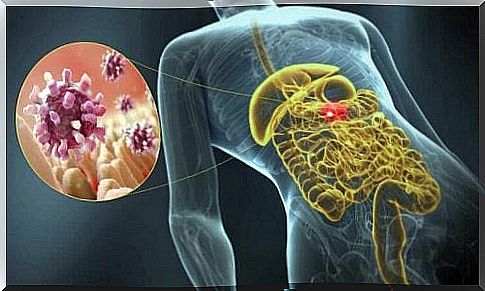Intestinal Flu: All Possible Causes

The intestinal flu ( Gastroenteritis also known as the stomach flu) causes inflammation of the intestines, causing diarrhea and vomiting.
What is the intestinal flu?
The intestinal flu is an infection of the digestive system that causes diarrhea and vomiting. They are often accompanied by abdominal pain and intestinal cramps, and some cases of flu can lead to severe dehydration.
The most common cause of intestinal flu in children is a viral infection, while in adults it appears as a result of a bacterial infection.
Who is at risk?
The intestinal flu is a very common disease. Worldwide, there are between 3 and 5 billion cases per year. It is one of the most common reasons for visiting a doctor in highly developed countries, which entails high costs.
The risk of infection is greatest during rainy seasons and in winter due to the poor quality of drinking water.

Intestinal flu can happen to anyone, but children are most at risk, especially those under the age of 5, due to a less developed immune system.
There is a large number of cases of this disease in developing countries. Often the cause is cholera germs due to insufficient hygiene and poor quality drinking water in many areas, which entails a high risk of an epidemic.
The causes of intestinal flu
As mentioned above, the main causes of the disease are viruses and bacteria, although there are cases of parasitic infections. A small percentage of cases occur due to non-infectious causes such as Crohn’s disease or lactose intolerance.

Viruses
- Rotaviruses.
- Noroviruses.
- Adenoviruses.
- Astroviruses.
Rotaviruses are the most common cause of infections in children due to their immature immune system and poor hygiene. In adults, the intestinal flu is most often caused by noroviruses.
Viruses are responsible for more than 70% of childhood diarrhea because their immune system cannot fight it effectively.
Bacteria
- Colon bacilli.
- Campylobacter jejuni.
- Salmonella.
- Clostridium difficile.
- Damn chick.
Pathogenic bacteria in food products are often the cause of intestinal flu. If food is stored at room temperature, bacteria multiply very quickly with a high risk of infection.
The bacteria Campylobacter jejuni often found in raw or undercooked infected meat.
Cholera is a disease caused by cholera that spreads through contaminated food or water . Cholera is the leading cause of bowel flu, especially in Africa and Asia.
The excessive and inappropriate use of antibiotics is another cause of the high number of cases of this disease. In elderly and hospitalized people, enteric flu occurs as a result of infection with Clostridium difficile bacteria.
How does intestinal flu spread?
The disease can be spread in many ways, but the most common are physical contact, contaminated water or food.
Most cases are recorded in the rainy months and in winter due to poor water quality.
The intestinal flu also spreads because of poor hygiene and malnutrition, which is common in children. However, the ways in which the disease is transmitted varies, and it is often impossible to identify the cause of an infection with certainty.
Incubation and contamination period
Symptoms of intestinal flu appear 1 to 3 days after infection. Diarrhea and vomiting usually disappear 3 to 8 days after the first symptoms appear. However, if left untreated, diarrhea can be acute or chronic.

However, it is worth taking into account that adults can become resistant to this disease, but be carriers of it. In other words, many people can infect others after their symptoms have cleared, so be sure to take the necessary precautions.
Symptoms of the intestinal flu
- Vomiting.
- Diarrhea : If you have a battery infection, you may see blood in your stools.
- Stomach pain.
- Intestinal cramps.
Complications
The most common complication of gut flu is dehydration due to diarrhea. Dehydration is classified as mild (<5%), moderate (5 – 9%), or severe (> 10%). In moderate and severe dehydration, changes in the patient’s appearance can be observed, such as sunken eyes, lack of tearing and dry mouth.
Moreover, patients are less active and their skin loses its elasticity.
Diseases with similar symptoms
- Intestinal obstruction .
- Diabetes.
- Appendicitis.
- Celiac disease.
- Food poisoning.
- Abuse of laxatives.
- Enteritis.
Only a doctor can diagnose bowel flu to rule out any other possible causes for your symptoms.
Treatment
Treatment of intestinal flu mainly focuses on maintaining adequate hydration and adequate nutrition. Sweetened drinks are not recommended as they can aggravate the symptoms of diarrhea. Hydration of the body is carried out using oral rehydration salts and clean water.
It is recommended to maintain a normal diet, reduce sugar and increase the amount of food products containing natural probiotics. In more severe cases, your doctor may recommend antiemetics, antibiotics or antispasmodics, but this is not common practice.

Prevention and vaccines
The main preventive factor is compliance with proper hygiene rules and consumption of uncontaminated food and water. Washing your hands lowers your risk of getting intestinal flu infection by 30 percent.
Very effective vaccines against rotavirus are now widely available.









